
Florist peddles pedals for flower power to tackle congestion
We’ll send you a myFT Daily Digest email rounding up the latest Supply chains news every morning.
The main distribution centre for Freddie’s Flowers — a floral delivery business focused on London — looks, in most respects, exactly as might be expected.
Big stacks of long cardboard delivery boxes stand in one corner of the unit in a high-ceilinged former factory by the River Wandle in Earlsfield, in the south-west of the city. But, in place of delivery vans, this centre has a fleet of long, electric-assisted bicycles, equipped with wide carrying platforms.
Freddie’s is one of a growing number of businesses seeking to combat urban congestion, parking restrictions, and the shortage of commercial drivers by making most of its deliveries by bicycle.
Couriers stack up to about 45 boxes on the Dutch-built Urban Arrow bicycles, before pedalling off towards destinations across central and south-west London.
Recommended Special ReportFuture of LogisticsLong hours and stagnant pay create transport bottlenecks2 hours ago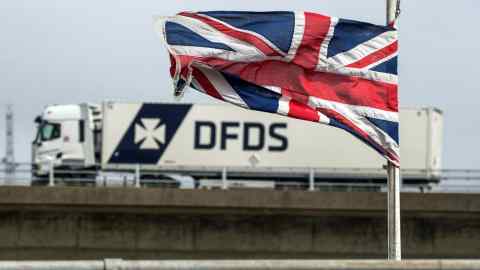
Such operations represent a fast-growing niche in many companies’ logistics operations. Express parcel operators such as DHL, specialist low-carbon delivery companies, and some other mainstream logistics companies are all exploiting the flexibility and speed of cargo bikes for some of their operations in many parts of the industrialised world.
Oxford’s John Radcliffe Hospital uses Pedal & Post, a local cycle courier company, to rush samples to the railway station, ready to be taken to London for processing.
Mark Philpotts, a cycling design specialist in the UK for Sweco, a Swedish-based consultancy, says this mode of transport has particular strengths in handling last-mile deliveries of perishable goods, just-in-time items, and high-value goods.
“It’s a direct competitor to electric vans,” Philpotts says. “You can stop where you like. You can service buildings more easily. You can take the bike into awkward locations — and you’ve not got the parking issues or the loading issues.”
Alice Scobie, head of UK deliveries, says Freddie’s Flowers happened upon the bike as a delivery method almost by accident after starting deliveries with vans when the business began in 2014.
Alice Scobie, head of UK deliveries, says Freddie’s Flowers © Anna Gordon for the Financial Times“We were having issues delivering to central London, especially to offices and to apartment buildings, because our vans deliver from about 2am and access was near-impossible at that time,” Scobie recalls.
So, in 2018, the company turned to making the most difficult deliveries via Pedal Me, a bike-taxi service that also carries substantial amounts of cargo.
“We realised it was a really good way of delivering because customers were getting their box, and also the fact it was not in a van and not using diesel, which was a huge thing for us,” Scobie says.
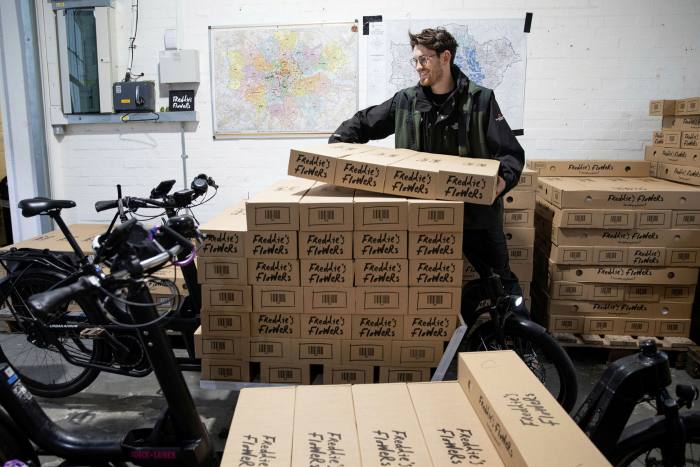 Deliver driver, Jamie Kay © Anna Gordon for the Financial Times
Deliver driver, Jamie Kay © Anna Gordon for the Financial Times 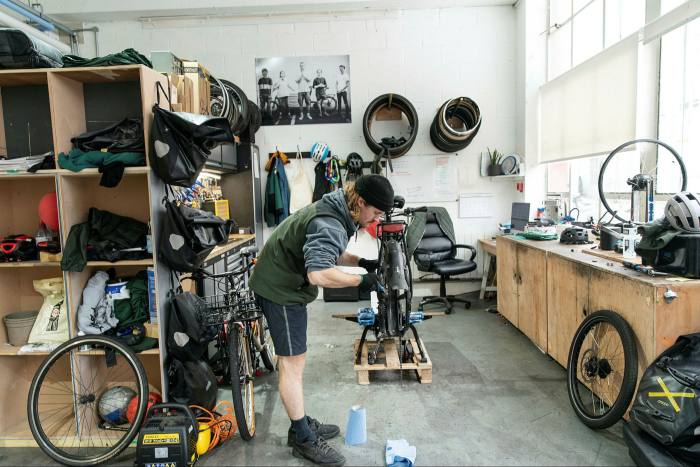 Freddie’s Flowers moved from outsourcing it’s delivery operations to moving them in-house. Shown: Drew Thompson, mechanic for Freddie’s Flowers © Anna Gordon for the Financial Times
Freddie’s Flowers moved from outsourcing it’s delivery operations to moving them in-house. Shown: Drew Thompson, mechanic for Freddie’s Flowers © Anna Gordon for the Financial Times The company quickly decided to buy its own bikes and run its own operations, she explains. “After seeing the advantages, we thought: ‘Why don’t we do it in-house?’”
Recommended Special ReportFuture of LogisticsDistribution groups grapple to reduce their carbon footprints2 hours ago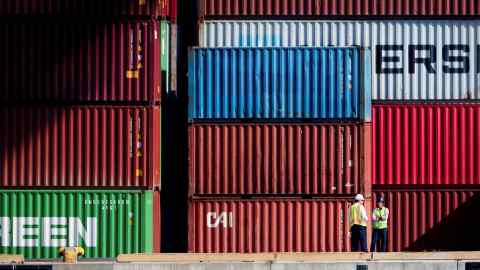
A shift to bicycles represents a substantial change for some companies used to relying on vans.
David Squire, co-founder of Farr Out Deliveries, which operates a cargo-bike courier operation based in Tollcross, on the edge of Edinburgh city centre, says his company has relied mainly on small local companies for business so far. He would like to see more co-operation between small local couriers to offer UK-wide services to larger companies. In the Netherlands, an association of local couriers offers such a service in the 40 largest towns across the country, where cargo cycle services are better developed.
“I think there’s massive potential we see within link-ups of different small couriers,” Squire says.
Such an idea could be particularly powerful if the services were also linked up by long-distance rail services, he points out.
Recommended The Big ReadCatch them if you can: the $14bn rise of rapid grocery delivery services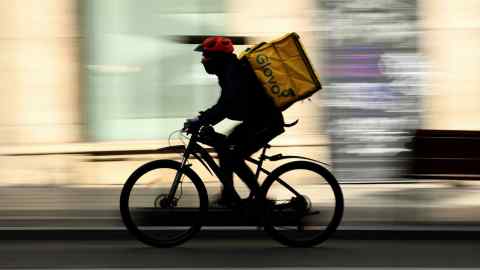
Squire, whose service mainly relies on Danish-built Bullitt cargo bikes, says customers are continually surprised by the bicycles’ capacity. They can handle loads of up to 100kg, and there is even capacity to carry up to 250kg if the bike is hauling a trailer. “People often think they can’t carry as much as a van,” Squire says. “But the vast majority of the time vans are 30 per cent full, and 30 per cent of a van — you could almost carry that much on a cargo bike.”
Philpotts says cargo bikes will never challenge motorised vehicles for deliveries of bulk goods such as cement. But modern, improved batteries and powerful electric motors have transformed the transport mode’s effectiveness.
“The whole issue of people being fit enough to use a bike is a bit different now,” Philpotts says. “E-assist really is a game-changer for all sorts of cycles.”
At Freddie’s Flowers, the shift to relying mainly on bicycles in London has had knock-on effects on how the business runs. Because the bikes face fewer problems with traffic congestion, riders work standard, 9am to 5pm hours, whereas van drivers tend to start at 4am or earlier.
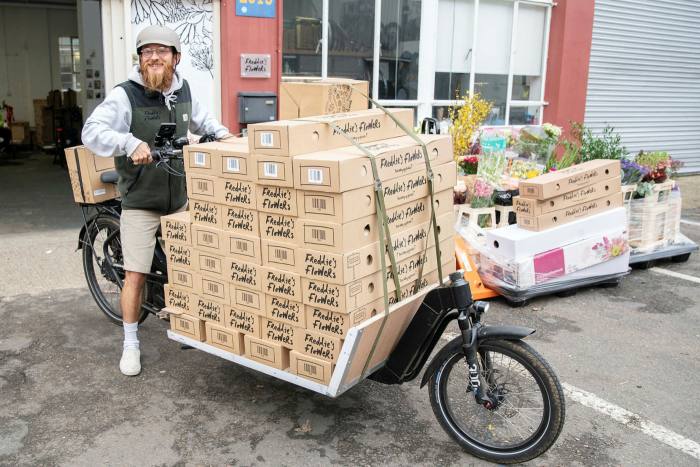 Petal pusher: Freddie’s Flowers riders such as Charlie Hill find bikes enable delivery at more social hours and with fewer parking worries © Anna Gordon for the FT
Petal pusher: Freddie’s Flowers riders such as Charlie Hill find bikes enable delivery at more social hours and with fewer parking worries © Anna Gordon for the FT That has encouraged riders such as Charlie Hills, a freelance graphic designer, to join the company. “Because the job is quite flexible, the hours are great, which means we have time in the afternoon to do our other jobs as well,” he says.
Recommended Special ReportFuture of LogisticsEuston trial shows appeal of letting the train take the strain2 hours ago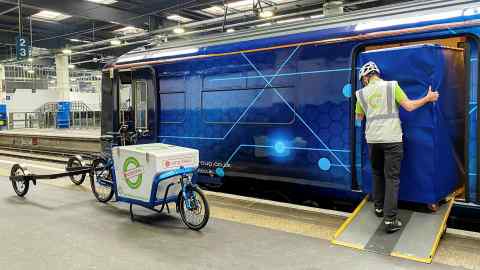
Although Freddie’s still uses vans for some deliveries — particularly in its business outside London — its deliveries in the capital increasingly rely on bicycles. It now delivers by bike from both the Earlsfield depot and another in Bermondsey, in south-east London. A planned depot in north London will take the number of deliveries it makes weekly by bike to around 12,000 to 13,000, according to Scobie.
At present, the company makes 75 per cent of its London deliveries by bike and aims to have 50 per cent of all of its UK deliveries made by emissions-free means within six months.
However, Scobie cites reasons well beyond the environmental benefits for being glad of having made the shift to bicycles.
“None of us realised how successful it would be and how positive it would be,” she says. “[That’s] not only the environmental factors but just the service factor is so much better than customers getting them in a van.”
The riders all interact well with the customers, she adds. “It’s just really efficient — which, basically, it has to be.”
{"focus":["cbab3e00-707c-453f-ac54-b2d0ddb7e1e9","59d55e5c-cb83-49dc-bacb-26dcc51566d0","06610896-2754-4847-a48f-9363d18a8c5e","3a351c6d-ab15-42d7-bf94-4a5295be57f8","4327e5de-2361-40f9-bc70-47fb918cb1ba","29e67a92-a3b8-410c-9139-15abe9b47e12","ec4ffdac-4f55-4b7a-b529-7d1e3e9f150c","82645c31-4426-4ef5-99c9-9df6e0940c00","6b683eff-56c3-43d9-acfc-7511d974fc01","d1252624-8645-438b-b521-9244aebdc99e","c47f4dfc-6879-4e95-accf-ca8cbe6a1f69"],"authorConcepts":["95ba1c07-26d5-4446-a760-eec66aff6994"],"displayConcept":"59d55e5c-cb83-49dc-bacb-26dcc51566d0"}Get alerts on Supply chains when a new story is published
Get alertsCopyright The Financial Times Limited 2021. All rights reserved.Reuse this content (opens in new window) CommentsJump to comments sectionPromoted ContentExplore the Special ReportREAD MOREFuture of LogisticsPort operators order ‘full steam ahead’ for supersized ships2 hours ago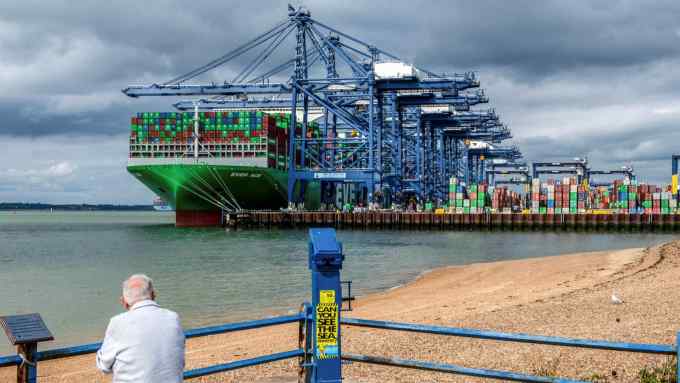
- Currently reading:Florist peddles pedals for flower power to tackle congestion
- Robotics supply helping hand to speedy order fulfilment
- Port operators order ‘full steam ahead’ for supersized ships
- Distribution groups grapple to reduce their carbon footprints
- Euston trial shows appeal of letting the train take the strain
- Long hours and stagnant pay create transport bottlenecks
- Vaccine distributors go the extra mile to help remote populations
- Industrial goods Add to myFT
- Supply chains Add to myFT
- London Add to myFT
- Robert Wright Add to myFT
Owl Media Group takes pride in providing social-first platforms which equally benefit and facilitate engagement between businesses and consumers and creating much-needed balance to make conducting business, easier, safer, faster and better. The vision behind every platform in the Owl Media suite is to make lives better and foster a healthy environment in which parties can conduct business efficiently. Facilitating free and fair business relationships is crucial for any thriving economy and Owl Media bridges the gap and open doors for transparent and successful transacting. No advertising funds influence the functionality of our media platforms because we value authenticity and never compromise on quality no matter how lucrative the offers from advertisers may seem.
Originally posted on: https://www.ft.com/content/d74fb4be-5cc7-47f0-b71d-40b46734ecfa
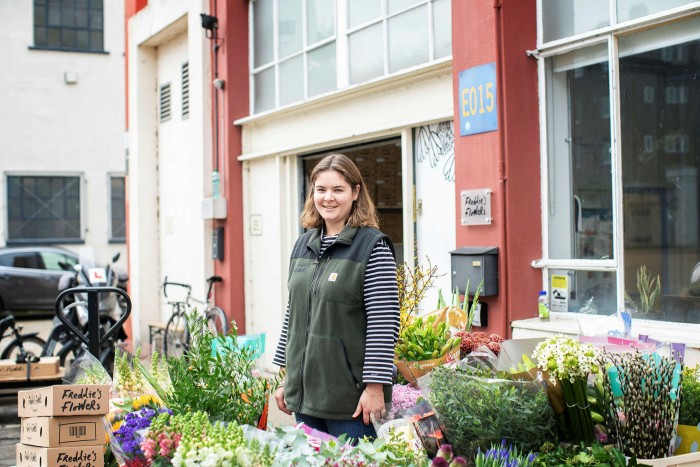 Alice Scobie, head of UK deliveries, says Freddie’s Flowers © Anna Gordon for the Financial Times
Alice Scobie, head of UK deliveries, says Freddie’s Flowers © Anna Gordon for the Financial Times